Chapter 17 spelled out the final, premillennial post probationary “judgment of the great whore,” representing Vatican City, who was supported on the back of the “scarlet coloured beast,” representing the devil. When the time was right, the “beast” cast her off his back by means of ten pagan kings. The scarlet beast himself then took her place and became the “eighth” pope, the last in the succession of the previous “seven heads” of the “beast.”
Although it is generally believed that the whore’s judgment will take place during the seventh plague (Revelation 16:17, 19), our exploration of Chapter 17 (especially, Verse 16) suggests it will take place during the second trumpet scenario (Revelation 8:8, 9) when “a great mountain burning with fire [is] cast into the sea”!
Now, in this chapter, John begins with another retrospective look back to a marvelous probationary event that takes place just before the judgment of “the woman . . . that great city, which reigneth over the kings of the earth” (Revelation 17:18).
Verse 1: And after these things I saw another angel come down from heaven, having great power; and the earth was lightened with his glory.
Interestingly, an “angel (singular)” is mentioned more than fifty times in the book of Revelation! In order to determine which is the other “angel,” we must refer to the context. All the other angels, from Revelation 14:15 to this verse, are depicted in a post-probationary context. The previous angels portrayed in a probationary setting are the three in Revelation 14:6, 8 and 9. This “angel,” is in addition to those three. He says nothing of the horrible event of Chapter 17:16 but, instead, brings a message to enlighten the whole “earth . . . with his glory.” It is a message of hope, in contrast to the other angel (Chapter 17) whose message concerned “the judgment of the great whore” who was “drunken with the blood of the saints, and with the blood of the martyrs of Jesus.”
Consequently, this message is intended to “enlighten” or eradicate the prevailing “MYSTERY” regarding “BABYLON THE GREAT” (Revelation 17:5), and it has to be given during probationary time, otherwise the message would be futile. Therefore, John here backtracks from the post probationary scenario (Revelation 17:16), into the probationary time of the “loud cry.”
Verse 2: And he cried mightily with a strong voice, saying, Babylon the great is fallen, is fallen, and is become the habitation of devils, and the hold of every foul spirit, and a cage of every unclean and hateful bird.
Note the similarity of this message to that of the second angel (Revelation 14:8) who said, “Babylon is fallen, is fallen, that great city, because she made all nations drink of the wine of the wrath of her fornication.” Now, because of her refusal to repent of her crimes and admit to the “nations” that she has been lying to them, she has descended down about as far as she can go into the depths of degradation. In this final stage of her fall, she is seen greedily housing “devils” and coveting “every foul spirit,” even treasuring “every unclean and hateful bird,” as if fearful they would somehow be taken from her! Evidently, her corruption is irreversible.
Although Chapter 17 focuses on the catastrophic event that will befall Vatican City, also called “BABYLON THE GREAT” (Verse 5), “This scripture points forward to a time when the announcement of the fall of Babylon, as made by the second angel of Revelation 14, is to be repeated, with the additional mention of the corruptions which have been entering the various organizations that constitute Babylon since that message was first given in the summer of 1844.” [4] Therefore, while Chapter 17 focuses on Vatican City, this chapter begins with the problems of the Babylonian system as a whole, illustrated by this picture of the tower of Babel mounted atop a prison housing disgusting creatures. [5]
“The second angel’s message of Revelation 14 was first preached in the summer of 1844, and it then had a more direct application to the churches of the United States, where the warning of the Judgment had been most widely proclaimed and most generally rejected, and where the declension in the churches had been most rapid. But the message of the second angel did not reach its complete fulfillment in 1844. The churches then experienced a moral fall, in consequence of their refusal of the light of the Advent message; but that fall was not complete. As they have continued to reject the special truths for this time, they have fallen lower and lower. Not yet, however, can it be said that ‘Babylon is fallen . . . because she made all nations drink of the wine of the wrath of her fornication.’ She has not yet made all nations do this. The spirit of world-conforming and indifference to the testing truths for our time, exists and has been gaining ground in churches of the Protestant faith in all the countries of Christendom; and these churches are included in the solemn and terrible denunciation of the second angel. But the work of apostasy has not yet reached its culmination.
“The Bible declares that before the coming of the Lord, Satan will work ‘with all power and signs and lying wonders, and with all deceivableness of unrighteousness;’ and they that ‘received not the love of the truth, that they might be saved,’ will be left to receive ‘strong delusion, that they should believe a lie’ [2 THESS. 2:9-11]. Not until this condition shall be reached, and the union of the church with the world shall be fully accomplished throughout Christendom, will the fall of Babylon be complete. The change is a progressive one, and the perfect fulfillment of Rev. 14:8 is yet future.” [6]
At this point, it seems impossible to overemphasize the importance of its future application, especially in consideration of its context. Among other things, review the “drunken” condition of the “woman” (Chapter 17), the three way division of “great Babylon,” when “the great river Euphrates . . . was dried up” (Chapter 16), “the temple” in heaven being “filled with smoke” (Chapter 15), “one like unto the Son of man” sitting on “a white cloud,” instead of in the “temple” (Chapter 14), the economic boycott (Chapter 13), the dragon’s wrath with “the remnant of” the good woman’s “seed” (Chapter 12) and even the time when the “two witnesses” are given “power” to “prophesy a thousand two hundred and threescore days, clothed in sackcloth” (Chapter 11). White invites us to “Read every verse [of chapter 11], and learn the things that are yet to take place in the cities. Read also the scenes portrayed in the eighteenth chapter of the same book.” [7] That statement brings us full circle back to Chapter 18.
By the time the message of this fourth “angel” is given, Babylon will have fallen. [8] It, as an organization, will have committed the unpardonable sin by causing “as many as would not worship the image of the beast should be killed.” On a massive scale [9] innocent people who refused to worship “the beast, neither his image, neither had received his mark . . .” will be “beheaded” (Revelation 20:4) causing the “great whore” to become “drunken with the blood of the saints, and with the blood of the martyrs of Jesus” (Revelation 17:6). [10] In that case, the devil will have her in total control.
Verse 3: For all nations have drunk of the wine of the wrath of her fornication, and the kings of the earth have committed fornication with her, and the merchants of the earth are waxed rich through the abundance of her delicacies.
In Revelation 14:8 “she made [or forced] all nations drink,” here they “have drunk” (past tense) suggesting the last stage of apostasy has been reached. In addition to the message of the second angel, this additional “angel” (Verse 1) [11] gives special warning, not only against “the kings of the earth, but against “the merchants of the earth,” who by this time will have “waxed rich through the abundance of [Babylon’s] delicacies.” Those “delicacies” are represented by the metaphoric “flood” of false doctrine the “vile person” used to overwhelm all who stood “before him” (Daniel 11:21, 22), resulting in an “abundance” of literal riches.
Ordinarily, the patron who fornicates with a prostitute pays the prostitute, making her rich. Here, the patron “merchants” become “rich,” because she rewards her “delicacies” [12] to “the merchants!” But, of course, she does not do this unless there is something in it for her. Therefore, she enters into this transaction in order to induce the “merchants” into committing something they would not ordinarily do unless they were desperate. Consequently, they must consider what she wants is immoral, which the Bible calls: “fornication.” This is symbolic “fornication.” And because it concerns a transaction between Babylon and the “merchants,” it must be some kind of an immoral business deal with great profit, not only benefiting the “merchants,” but making it possible for the “woman” to become “drunken with the blood of the saints, and with the blood of the martyrs of Jesus” (Revelation 17:6).
Verse 4: And I heard another voice from heaven, saying, Come out of her, my people, that ye be not partakers of her sins, and that ye receive not of her plagues.
If the other “angel . . . from heaven” (Verse 1) was the “fourth angel,” and if this voice is from an angel, it would be the fifth. [13] His message is very encouraging. Since the pronoun “her” refers to “Babylon the great,” and this heavenly “voice” calling His “people” who are still in Babylon to “Come out” suggests that there is still great hope for those people. Consequently, this verse allows us to be very optimistic for the success of the loud cry, because: “According to this scripture, many of God’s people must still be in Babylon. And in what religious bodies are the greater part of the followers of Christ now to be found? Without doubt, in the various churches professing the Protestant faith.” [14]
In fact, “Notwithstanding the spiritual darkness and alienation from God that exist in the churches which constitute Babylon, the great body of Christ’s true followers are still to be found in their communion.” [15] Undoubtedly, that “great body” is the “great multitude, which no man could number, of all nations and kindreds, and people, and tongues . . .” (Revelation 7:9). They responded to the “tidings out of the east” (Daniel 11:44) proclaimed by the “kings of the east” (Revelation 16:12).
Therefore, the messenger angel (Verses 1, 2) who “cried mightily with a strong voice” must be representative of the saints on earth who proclaimed the “loud cry.” The same holds for the three angels (Revelation 14:6-9) and the other “angel . . . out of the temple” (Revelation 14:15), all of whom represent the saints on earth.
Although “the punishment of Babylon, the united apostate religious organizations of the earth, takes place under the seventh plague,” [16] the judgment of “Babylon the great,” namely Vatican City, precedes the plagues. But none of these plagues, be they trumpet or vial, are intended to terrify the unbeliever into complying with the invitation, because they do not come until after the close of probation when true compliance is no longer possible. [17] During the probationary time of the loud cry, God calls upon the responders to exercise faith that the warning is a valid call from God, just as Noah’s warning to the antediluvians to enter the ark came while the sun was still shining.
“The angel who unites in the proclamation of the third message is to lighten the whole earth with his glory. A work of world-wide extent and unwonted power is here brought to view. The Advent movement of 1840-44 was a glorious manifestation of the power of God; the first message was carried to every missionary station in the world, and in this country there was the greatest religious interest which has been witnessed in any land since the Reformation of the sixteenth century; but these are to be far exceeded by the mighty movement under the loud cry of the third message. The work will be similar to that of the day of Pentecost. Servants of God, with their faces lighted up and shining with holy consecration, hasten from place to place to proclaim the warning from Heaven. By thousands of voices, all over the earth, the message will be given. Miracles are wrought, the sick are healed, and signs and wonders follow the believers. Satan also works with lying wonders, even bringing down fire from heaven in the sight of men. Thus the inhabitants of the earth are brought to take their stand.” [18]
“Now the rays of light penetrate everywhere, the truth is seen in its clearness, and the honest children of God sever the bands which have held them. Family connections, church relations, are powerless to stay them now. Truth is more precious than all besides. Notwithstanding the agencies combined against the truth, a large number take their stand upon the Lord’s side.” [19]
Verse 5: For her sins have reached unto heaven, and God hath remembered her iniquities.
Quoting the Commentary: “The sins of Babylon are depicted as a mountainous mass reaching upward, compact and glued together . . . As the figurative mountain pierces the sky, so the criminal career of ‘Babylon the great’ arises before God, calling for retribution.” [20] In other words “She has filled up the measure of her guilt, and destruction is about to fall upon her” [21] which is the reward spoken of beginning in the next verse.
Therefore, at this point, “God’s long-suffering is about to end and His judgment upon mystical Babylon about to be executed.” [22] Probation is about to close, not only for “Babylon the great” in specific, but for the world in general when Jesus takes “the censer” and fills it completely “with fire . . . and cast[s] it into the earth” (Revelation 8:5). Likewise, the “two witnesses, two olive trees, and the two candlesticks” (Revelation 11:3, 4) will have finished their “testimony” (Revelation 11:7). This final call is to “worship him that made heaven, and the earth, and the sea, and the fountains of waters” (Revelation 14:7), instead of the sea “beast” that “all that dwell upon the earth shall worship . . . whose names are not written in the book of life . . .” (Revelation 13:8). This is when Jesus, “one . . . like unto the Son of man” takes His place on the great “white cloud . . . having on his head a golden crown, and in his hand a sharp sickle” (Revelation 14:14).
Verse 6: Reward her even as she rewarded you, and double unto her double according to her works: in the cup which she hath filled fill to her double.
This injunction belongs to the “voice from heaven” speaking to “my people” (Verse 4). It seems to be telling them to take up the sword of vengeance and administer it themselves. But as Paul reminded his followers: “Recompense to no man evil for evil” and “avenge not yourselves, but rather give place unto wrath: for it is written, Vengeance is mine; I will repay, saith the Lord” (Romans 12:17, 19).
Nevertheless, during the time of their passive resistance, during post probationary time, the saints, being mindful of the things taking place, will cry “with a loud voice to him that sat on the cloud, Thrust in thy sickle, and reap: for the time is come for thee to reap; for the harvest of the earth is ripe” (Revelation 14:15). [23]
Therefore, “Say not thou, I will recompense evil; but wait on the LORD, and he shall save thee” (Proverbs 20:22). He will “judge and avenge our blood on them that dwell on the earth” (Revelation 6:10). Then, “Babylon the great” will learn “It is a fearful thing to fall into the hands of the living God” (Hebrews 10:31). Even though she will suffer at the hands of “the ten [pagan] kings” who “shall make her desolate and naked, and shall eat her flesh, and burn her with fire” it will be “God [who will] put into their hearts to fulfil his will . . .” (Revelation 17:16, 17). Therefore, her doubled reward first destroys her “seat” in the Vatican, then, at the end of the “seven last plagues,” the entire system will be dissolved. (Revelation 15:1; 16:19).
Verse 7: How much she hath glorified herself, and lived deliciously, so much torment and sorrow give her: for she saith in her heart, I sit a queen, and am no widow, and shall see no sorrow.
“Arrogant self-confidence has made her confident of the ultimate success of her plot to obliterate God’s remnant people and to reign supreme over the earth. She is proud of her wealth, popularity, and power.” [24]
She did not forget the lesion of the past when she sustained the “deadly wound” (Revelation 13:3; Daniel 11:26) after “the ships of Chittim [came] against him [her]” (Daniel 11:30) [25] during Reformation times. That experience, instead of bringing repentance and reformation, was resented and she held terrible “indignation against the holy covenant” (Daniel 11:28, 30). Consequently, she became a figurative “widow” because of the death of her former royal lovers who previously acknowledged her authority to authenticate their power as rulers of the nations. Napoleon, who snatched his crown from the hand of the pope during his coronation, [26] changed all of that.
More than 200 years have slipped by since 1798. With success attending her every step of the way, especially since 1929, she has begun to “exalt [her]self, and magnify [her]self till the indignation be accomplished: for that that is determined shall be done” (Daniel 11:36). She has only one object in mind: to regain the lost glory she enjoyed during the Dark Age of history when her “noon . . . was the midnight of the world.” [27] As far as she is concerned, and judging by how things have been going, there is no reason for her to believe she will not fully achieve her goal, resulting in the future Dark Age of the world. Her success is prophesied to be such that he/she will “have accomplished to scatter [28] the power [29] of the holy people . . .” (Daniel 12:7).
Verse 8: Therefore shall her plagues come in one day, death, and mourning, and famine; and she shall be utterly burned with fire: for strong is the Lord God who judgeth her.
While the “seven last plagues” (Revelation 16) will probably last several days― “the rest of the beasts . . . had their dominion taken away: yet their lives were prolonged for a season and time” (Daniel 7:11, 12) [30] ―the woman’s “plagues,” consisting of “death, and mourning, and famine” and “fire,” last only “one day” [31] or at least a much shorter period of time.
The traditional view of the trumpets considers them to “retrace, to a large extent, the period of Christian history already covered by the seven churches and the seven seals, and that they emphasize outstanding political and military events during this period,” [32] placing “the judgment of Babylon as an organization . . . under the seventh plague,” with “a literal famine . . . experienced by the adherents of Babylon” that is said to take place under the “fourth plague.” [33] That leaves us to wonder how these events could happen in only “one day.” With such a view, it would be inconsistent to refer back to the second trumpet “where a great mountain [34] burning with fire” is depicted, in spite of the fact that no consuming fire, whatsoever, is alluded to during the seven last plagues (Chapter 16). That conclusion also makes the “fire” figurative, in spite of the fact that the woman is “utterly burned [35] with fire.” [36] Furthermore, there is no mention of “famine” in the fourth plague (Revelation 16:8).
However, knowing that the trumpet scenario, following in sequence with the casting down of the “censer” (Revelation 8:5), signaling the release of the “four winds of the earth” (Revelation 7:1), and causing the “earth, sea” and “trees” to be hurt (Revelation 7:2; 8:7, 8), there is no need to have any reservations about the future application of the trumpets, including the fiery scenario of the second. Additionally, the “burning flame” that destroys the “little horn” power after it becomes “the beast” (Daniel 7:11) is further confirmatory evidence of the literalness of this future trumpet catastrophe.
So, in spite of the woman’s self-aggrandizement (Verse 7), boasting that she sits “a queen, and . . . shall see no sorrow,” this ghastly event proves, in only “one day,” that God “who judgeth her” has the last word.
Verse 9: And the kings of the earth, who have committed fornication and lived deliciously with her, shall bewail her, and lament for her, when they shall see the smoke of her burning,
These “kings” cannot be the “ten kings” of Revelation 17:12, for they enjoyed “power as kings [only] one hour with the [demonic] beast,” while these kings lived “deliciously with” the “MOTHER OF HARLOTS” (Revelation 17:5) much longer while they were committing “fornication” with “the great whore that sitteth upon many waters” (Revelation 17:1, 2), at least since 1798. [37]
While viewing the actual “smoke of her burning,” their crying and lamenting suggest they loved her dearly, while the “ten . . . one hour” pagan “kings” probably hated the “whore” right from the start. The love affair of the long-term earthly kings with “Babylon” could be due to their having been able to survive economic disaster because of their adulterous relationship with her. Now, bankruptcy faces them.
Note again that the “vile person,” who parallels “Babylon” in this chapter, causes the “strong holds . . . to rule over many, and shall divide the land for gain” (Daniel 11:21, 39), with the “strong holds” being parallel to “the kings of the earth.” Evidently, these “kings of the earth” will lose their power when “Babylon” (the Vatican) is destroyed, the incident alluded to in Daniel 7:11.
How is “Babylon” able to give the “kings of the earth” or the “strong holds” the power “to rule over [the] many”? Note the words “lived deliciously.” They are translated from a single Greek word “streinao” meaning “to be wanton, to live luxuriously.” Such a manner of life began when “the kings of the earth . . . committed fornication” with “Babylon” (Revelation 17:2) (the placement of “the abomination that maketh desolate” ―Daniel 11:31; 12:11), which must have satiated them with “the abundance of her delicacies” (Verse 3), freeing them from their economic woes. Little wonder they mourn her demise.
Verse 10: Standing afar off for the fear of her torment, saying, Alas, alas, that great city Babylon, that mighty city! for in one hour is thy judgment come.
This is strange. If the “kings of the earth” were in full sympathy with her, why do they stand “afar off for the fear of her torment” instead of rushing to her aid? Note that same term is used in Verses 15 and 17 regarding the behavior of the “merchants” and the “sailors.” Do they stand “afar off” because they are cowards or is it just plain common sense? I suggest the later. One of the most feared disasters of current history is radiation hazard. The melt down of the Russian nuclear reactor in Chernobyl is a prime example. The only protection available to the surrounding community was rapid evacuation and to stand as “afar off” as possible. It seems likely the same holds for the “kings of the earth” who dare not approach the site of her “burning” for fear of exposing themselves to its deadly radiation!
Their sorrow is for selfish reasons. Evidently the power of their rule was greatly augmented by linking hands with the “woman,” instead of the “beast,” even though their relationship with the beast, who gave the “woman” her “power, seat, and great authority” (Revelation 13:2), [38] was real, although indirectly.
Verse 11: And the merchants of the earth shall weep and mourn over her; for no man buyeth their merchandise any more:
According to one view, the “’merchants’ are the literal commercial and business leaders of the earth” and the “’merchandise” refers to “literal articles of manufacture and trade.” The other view is a “figurative interpretation” representing the “doctrines and policies of mystical Babylon.” [39] The first view seems a more likely interpretation. Verse 3 gives the reason for the merchantmen’s grief. It is because they had “waxed rich through the abundance of her delicacies.” Now, the buyer of their goods has been destroyed.
This takes us back to the book of Daniel where the “vile person . . . shall divide the land for gain” (Daniel 11:21, 39). [40] As we learned there, this is when “he,” [41] the “vile person,” will disenfranchise all who refuse “his” identifying “mark” called “the abomination that maketh desolate” (Daniel 11:31; 12:11). One of his means of enforcement is through “spoil,” [42] the same method used during the historic Dark Age when “he shall scatter [43] among them the prey, [44] and spoil, and riches” (Daniel 11:24), and during the future Dark Age when he will use the same technique by afflicting those who resist him through “spoil” as well as by “sword . . . flame” and “captivity” (Daniel 11:33).
In other words, all who resist the “image” and the “mark,” (Revelation 13:16, 17) or “the abomination” (Daniel 11:31; 12:11), will not only face the threat of death and imprisonment, but will also have their goods confiscated. This will be a golden opportunity for “the merchants of the earth” who will eagerly seize those goods and sell them to the Vatican who will buy them, probably at the inflated prices demanded by the “merchants of the earth.” The woman’s destruction brings that traffic to a halt.
This gives us some insight into how many will refuse to cooperate with the “woman.” Since the “merchants of the earth are waxed rich through the abundance of her delicacies,” there must have been a very great number of people who had their goods confiscated for refusing the “image” and the “mark;” and the “woman” herself must be very wealthy in order to be able to pay the “merchants” what they demand.
Verses 12 & 13: The merchandise of gold, and silver, and precious stones, and of pearls, and fine linen, and purple, and silk, and scarlet, and all thyine wood, and all manner vessels of ivory, and all manner vessels of most precious wood, and of brass, and iron, and marble, And cinnamon, and odours, and ointments, and frankincense, and wine, and oil, and fine flour, and wheat, and beasts, and sheep, and horses, and chariots, and slaves, and souls of men.
I agree with the Commentary that decries any effort “to draw some hidden meaning from” “the 28 items of trade listed” in these verses, [45] because the meaning is clear. While the Commentary asserts that the “character of ch. 18” is “highly diffuse and poetic,” I, with all due respect, see it as highly specific and literal for goods that are deemed valuable. It is a revelation of the Vatican’s truly astonishing wealth which probably surpasses all that the mind can imagine. [46]
But, without going into further detail, what about the “slaves, and souls of men?” During the time of the civil war, White denounced those who “heartily engage in the enormous and grievous sin, and deal in slaves and souls of men. Angels have recorded it all . . . God will restrain his anger but a little longer. His anger burns against . . . the religious bodies who have sanctioned, and have themselves engaged in this terrible merchandise.” [47]
According to what John saw, when “the heaven departed as a scroll . . . and every mountain and island were moved out of their places,” there were, among the others who witnessed the coming “of him that sitteth on the throne” at the time of “the great day of his wrath,” bondmen (Revelation 6:14-17), or slaves, denoting the fact that slavery will be very much alive at the time of the second coming. [48]
Not all the slaves will cry for the rocks and mountains to fall on them. At that same time “when the never-ending blessing [is] pronounced on those who had honored God, in keeping His Sabbath holy, there [is] a mighty shout of victory over the beast, and over his image.” Then, says White, “I saw the pious slave rise in triumph and victory, and shake off the chains that bound him, while his wicked master was in confusion, and knew not what to do; for the wicked could not understand the words of the voice of God. Soon appeared the great white cloud.” [49]
But, while “slaves,” [50] or bodies [51] can be confiscated, captured, stolen, and resold, marketing the “souls of men” is another matter. Consequently, it must be the “merchants” who indulge in such traffic, who really sell their own “souls” to the Devil! Even though they are able to escape the fire “of her burning,” their doom is no less certain.
Verse 14: And the fruits that thy soul lusted after are departed from thee, and all things which were dainty and goodly are departed from thee, and thou shalt find them no more at all.
With the exception of the “wine, oil, flour, wheat, beasts, sheep and horses” in the list of Verses 12 and 13, most of the items were inedible. This lists the items the “woman” particularly “lusted after . . . which” she considered “dainty and goodly.” Evidently, they are edible things consisting of “‘fruits,’ or more specifically, ‘the season of ripe fruits,’ in late summer or early autumn.” [52] Note the lack of reference to flesh food, which is surprising.
Nevertheless, the list is suggestive of gluttonous, self-indulgence and decadence. Note the phrase “no more at all,” used six times (Verses 14, 21, 23), depicting her descent into “perdition,” even before the “beast that . . . was, and is not” (Revelation 17:11). This means her “judgment” (Revelation 17:1) is final, not unlike “the second death,” alluded to in Chapters 2:11; 20:6, 14; and 21:8, although this scenario occurs during pre-millennial time while the “second death” occurs during post millennial time.
Verses 15, 16, 17 (first part): The merchants of these things, which were made rich by her, shall stand afar off for the fear of her torment, weeping and wailing, And saying, Alas, alas, that great city, that was clothed in fine linen, and purple, and scarlet, and decked with gold, and precious stones, and pearls! For in one hour so great riches is come to nought.
With so much time devoted to the matter of the “merchants” (see Verses 3, 11, 15, 16, the first part of 17, and even a part of Verse 23), one has to wonder if this scenario is actually depicting the despair caused by the “national ruin” predicted to follow after “Protestant America [has] formed an image to the papacy,” ending in “a national apostasy . . .” [53] No business can prosper without a market. The effect of “national ruin” may trigger a depression unlike any other experienced by any other nation! Because of a ripple effect, it could initiate an economic melt-down felt, not only by the nation, but spreading globally because these are the “merchants of [all] the earth” (see Verse 11), not just the United States.
Another possibility is that the economic sanction (Revelation 13:17) imposed on those who refused the “mark” during probationary time, caused the shutdown of many business enterprises in America upon which its infrastructure was based. As a result, it quickly led to the “national ruin” specified. Instead of lifting the sanction, in order to reverse the trend, the illicit market established by Rome was set up, giving incentive to the “merchants of the earth” to buy all the confiscated goods they could lay their hands on and sell them to Rome for a rich profit. Such a scenario would engender a “feeding frenzy,” impossible to stop, short of total, economic collapse.
How could the business world, operated by men who live in the “real world” and use common sense to make their decisions, ever fall into such a destructive tailspin? The only answer is that “the kings of the earth . . . and the inhabitants of the earth” and “all nations” will “have been made drunk with the wine of her fornication” (Revelation 17:2; 18:3). Simple greed, coupled with the specter of future riches to prevent impoverishment, overpowers their better judgment.
Note, just like the “kings of the earth” who are seen “standing afar off for fear of her torment,” the “merchants of these things” also “stand afar off,” ostensibly for fear of radiation hazard.
Note also, “the great city . . . was clothed in fine linen, and purple, and scarlet, and decked with gold, and precious stones and pearls” like the vile person who “shall have power over the treasures of gold and of silver, and over all the precious things of Egypt,” after his vicious retaliation against the “king of the south” (Daniel 11:40, 43).
Verses 17 (last part), 18, 19: And every shipmaster, and all the company in ships, and sailors, and as many as trade by sea, stood afar off, and cried when they saw the smoke of her burning, saying, What city is like unto this great city! And they cast dust on their heads, and cried, weeping and wailing, saying, Alas, alas, that great city, wherein were made rich all that had ships in the sea by reason of her costliness! for in one hour is she made desolate.
Without understanding when the future trumpet scenario begins (Revelation 8:7), these verses seem strangely out of place. Although the Commentary insists this is still “highly figurative language,” it correctly defines “shipmaster, company in ships, trade by sea” in very literal terms. [54] That point alone argues for a literal application.
Notice the twice mentioned “ships” (Verses 17, 19) and compare the parallel “ships” (Revelation 8:9), where, after “the second angel sounded” his trumpet, and “the third part of the ships were destroyed.” [55] Without doubt, those are the same “ships” depicted here in Chapter 18. Doubtless, also, such a catastrophe would cause great sorrow among the shipmasters, company in ships and the sailors who operate them.
But that is not their only loss. Even though we can assume two thirds of their “ships” were left intact, the same market that the “merchants of the earth” had just lost, was now also gone for the sea faring men. They now allude to the fact that there is no other “city” in the world “like unto this great city!” In other words, there are no other buyers for the illicit “merchandise,” depicted in Verses 12 to 14, that they were transporting to Vatican City, because that “city,” who has been adding to her treasure for centuries, is thus, “by reason of her costliness,” [56] the wealthiest in the world and well able to finance this illicit traffic.
The prosperity resulting to the merchants of the earth, shipmasters, sailors and sea traders, should be considered additional evidence that there was a large number of people who refused submission to the “beast, his image” and “his mark” and were willing to forsake their possessions in order to preserve freedom of worship.
“And it shall come to pass, that in all the land, saith the LORD, two parts therein shall be cut off and die; but the third shall be left therein. And I will bring the third part through the fire, and will refine them as silver is refined, and will try them as gold is tried; they shall call on my name, and I will hear them: I will say, It is my people: and they shall say, The LORD is my God” (Zechariah 13:8,9).
Even though a “third” seems relatively small, one third of six billion [57] is still a very large number of people whose confiscated goods become a gold mine for the “merchants of the earth” and the sea faring men.
Verse 20: Rejoice over her, thou heaven, and ye holy apostles and prophets; for God hath avenged you on her.
The joy expressed here is in stark contrast to the grief displayed by the “kings of the earth . . . merchants of the earth” and those who “trade by sea” (Verses 9, 11, 17). Since this scene is in context with the event that occurred during the second trumpet (Revelation 8:8,9), these “holy apostles and prophets,” along with the heavenly, angelic host, will have manifested their joy prior to the rescued saints who “had gotten the victory over the beast” (Revelation 15:2) and the 144,000 pictured standing on “mount Sion” (Revelation 14:1). In other words, it will have taken place prior to the second coming.
So, in this verse, the invitation to “rejoice” is extended to those in “heaven,” and the “holy apostles and prophets” who are “more likely, those of Old Testament times.” [58] Who then, are these apostles and prophets? Quite likely, they are “the saints which slept” and “arose” when their “graves were opened” just after Jesus died on the cross (Matthew 27:52, 53). They “were raised to everlasting life” and “ascended with [Jesus] as trophies of His victory over death and the grave.” [59] Other examples of “apostles and prophets” are Enoch, Moses and Elijah who were taken to heaven long before Christ’s resurrection. But none of those people had direct contact with the “great whore” who arose some 500 years after Christ’s resurrection. So, in what sense could it be said that they are “avenged” by the death of the “great whore”?
Even though they were in heaven, safe from direct contact with her, they suffered right along with God’s people on earth as they watched her atrocious behavior, and suffering she inflicted for 1260 long years during the historic Dark Age, and especially during the future Dark Age when she became “drunken with the blood of the saints, and with the blood of the martyrs of Jesus” (Revelation 17:6) who refused to worship “the beast, neither his image, neither [to receive] his mark upon their foreheads, or in their hands” (Revelation 20:4). It must have been agony for the heavenly watchers. So, lack of direct contact and being immortal did not spare them the stress of empathy. Their great joy at seeing the destruction of the “whore” can be readily understood from that perspective.
Verse 21: And a mighty angel took up a stone like a great millstone, and cast it into the sea, saying, Thus with violence shall that great city Babylon be thrown down, and shall be found no more at all.
As if demonstrating before the heavenly dwellers what just took place on earth during this celebration service, this “mighty angel” takes “up a stone,” that represents the “great mountain” of Revelation 8:8. Although the “millstone” was not burning like the “mountain,” both “millstone” and “mountain” were, alike, “cast . . . into the sea.” Jeremiah also depicted “Babylon” as a “destroying mountain . . . which destroyest all the earth.” Then, God says, “I will stretch out mine hand upon thee, and roll thee down from the rocks, and will make thee a burnt mountain.” (Jeremiah 51:24, 25). Interestingly, in a following verse: “The sea is come up upon Babylon: she is covered with the multitude of the waves thereof.” (Jeremiah 51:42) [60]
Therefore, this “mighty angel” is demonstrating what is to take place during the second trumpet scenario (Revelation 8:8, 9). When his figurative “millstone” strikes the “sea,” he leaves it up to the imagination to visualize the resulting tsunami destroying “the third part of the ships.” That, in turn, causes the great grief expressed by “every shipmaster, and all the company in ships, and sailors, and as many as trade by sea” (Verse 17).
Therefore, this angel demonstrates, in symbolic manner, that which is to take place literally, reinforcing the fact that: “The teachings of this book are definite, not mystical [61] and unintelligible.” [62] The second trumpet episode is very definite!
But Rome is some thirty miles inland from the sea. How could its destruction also involve the destruction of sea going vessels, especially such a large number of them? If we accept the premise that the great millstone, that the angel thrust into the sea, is intended to demonstrate a literal event, a great tsunami would be generated which would scuttle every floating object in its path. In light of present-day technology, such a catastrophe could well be caused by atomic weaponry, inconceivable just a few years ago, but very possible, even likely. The enormity of destruction possible with one atomic or hydrogen warhead is nearly unlimited. Multiple warheads sent against the surrounding countryside could easily involve the Mediterranean Sea and all the cargo ships that happen to be present. The thirty or so miles of separation between the city and the sea would not protect the sailors and shipmasters who were manning the ships.
The unlikeliness of such an event probably accounts for the lack of comment made on these verses by Uriah Smith. [63] Mervyn Maxwell [64] says more, but with little elaboration. The Commentary compares the “millstone” to one “turned by an animal” instead of one that was “turned by hand.” It says more about the “violence” with which it was cast into the sea: “with a rush,” “with a shock.” This word violence “is used by classical Greek writers of the shock of battle and of a surging flood . . . with one tremendous throw the millstone is hurled into the depths of the sea.” [65]
The Commentary’s remarks that the “One day” (Verse 8) should be understood as “a point―rather than a period—of time, and thus appear to stress suddenness and unexpectedness rather than duration,” [66] certainly have application to the angel’s demonstration in Verses 21 to 24 as well.
Verses 22, 23: And the voice of harpers, and musicians, and of pipers, and trumpeters, shall be heard no more at all in thee; and no craftsman, of whatsoever craft he be, shall be found any more in thee; and the sound of a millstone shall be heard no more at all in thee; And the light of a candle shall shine no more at all in thee; and the voice of the bridegroom and of the bride shall be heard no more at all in thee: for thy merchants were the great men of the earth; for by thy sorceries were all nations deceived.
This verse calls to mind the “days that were before the flood [when] they were eating and drinking, marrying and giving in marriage . . . and knew not until the flood came, and took them all away” (Matthew 24:38, 39). “How much she hath glorified herself, and lived deliciously” saying “in her heart, I sit a queen, and am no widow, and shall see no sorrow” (Verse 7), unmindful of the doom coming upon her.
Her fate could be compared to a bottomless pit―illustrated here―gone forever and seen “no more at all.”
Verse 24: And in her was found the blood of prophets, and of saints, and of all that were slain upon the earth.
The Commentary remarks: “Mystical Babylon represents apostate religion since the beginning of time.” That concept harmonizes well with the “horse that was red,” representing the “synagogue of Satan” who “say they are Jews [in the spiritual sense] and are not, but do lie” (see Revelation 2:9; 3:9; 6:4).
The Commentary goes on to say: “However, chs. 13 to 18 are concerned most particularly with the culmination of apostasy at the end of time. Thus, in a general sense, ‘all that were slain’ may properly include the martyrs of all time, but emphasis here is doubtless on those who lay down their lives in the closing struggle of the great controversy between good and evil, and probably also those whom Babylon purposes to slay but is prevented from slaying, by divine intervention.” [67]
Summary of Chapter 18: Like all the other chapters of Revelation, this, too, must be viewed in context with the preceding, which left us with a reference to “the woman . . . that great city” namely “Rome, the haughty see,” representative of the Vatican, which ended up being burned “with fire” (Verse 16) during the post probationary second trumpet scenario (Revelation 8:8, 9). While the opening of this chapter portrays the probationary time of the loud cry, the great body of this chapter, beginning in Verse 5, describes the lament of three chief characters who witness her fiery demise as a literal city. They are the “kings of the earth, merchants of the earth” and the sea farers, all of whom were profited by the Vatican while she was alive. In an attempt to understand the nature of the suddenness and violence connected with her destruction, we are left with only two choices: (1) a direct action of God Himself, or (2) an indirect action by the ten pagan kings (Revelation 17:12, 16, 17), who, it seems, used atomic weapons to accomplish their purpose.
_____________________________________________________________
[1-3] deleted
[4] The Great Controversy by E.G. White, page 603
[5] Note the word “hold” from the Greek “phulake,” translated “prison” thirty-six times in other parts of the New Testament,” suggesting, instead of excluding and shunning these disgusting spirits, Babylon deliberately, and knowingly retains, even treasures, the things represented by “devils . . . foul spirits” and “unclean and hateful bird[s].”
[6] The Great Controversy by E.G. White, pages 389, 390 (italics and ellipse not supplied; underlining supplied)
[7] Manuscript Releases by E.G. White, Vol. 21, page 91 (bracket supplied)
[8] Recall the metaphor “bottomless pit” (Revelation 9:1, 2, 11; 11:7; 17:8; 20:1, 2) to designate post probationary time.
[9] “The scenes of the betrayal, rejection, and crucifixion of Christ have been reenacted, and will again be reenacted on an immense scale.” (Selected Messages by E.G. White, Book 3 pages 415, 416)
[10] Even though the “woman” (Chapter 17) is specifically named “BABYLON THE GREAT,” that name here must include, not only “THE MOTHER,” but also her daughter “HARLOTS.” Therefore: “The message of Revelation 14, announcing the fall of Babylon, must apply to religious bodies that were once pure and have become corrupt. Since this message follows the warning of the judgment, it must be given in the last days; therefore, it cannot refer to the Roman Church alone, for that church has been in a fallen condition for many centuries.” (The Great Controversy by E.G. White, page 383) Therefore, the message of Chapter 18 must also apply to both parties. Nevertheless, “Babylon the great” is a specific reference to the Vatican (Chapter 17:5) who, by this time, has become “the habitation of devils, and the hold of every foul spirit, and a cage of every unclean and hateful bird.” These words vividly describe the spiritual condition of things prevailing in the Vatican right now. They bring confirmation to the words of Archbishop Emmanuel Milingo “a formerly high-ranking cleric who first spoke out about Satanism in the Vatican, and took a lot of heat for it.” He goes on to say: “The devil in the Catholic Church is so protected now that he is like an animal protected by the government; put in a game preserve that outlaws anyone, especially hunters, from trying to capture or kill it. The devil within the Church today is actually protected by certain Church authorities from the official devil-hunter in the Church—the exorcist. So much so that the exorcist today is forbidden to attack the devil. The devil is so protected that the one who is the hunter, the exorcist, is forbidden to do his job.” (This quote came from the website: http://www.theharrowing.com/devil.html, that has since been removed from the internet!) Correspondingly, it should be no surprise that pedophilia, one of the sins recently given wide exposure by the press, seems engrained in the psyche of the clerics.
[11] Interestingly, White says nothing about a “fourth angel.” We find a “fourth angel” who sounds the fourth trumpet (Revelation 8:12), and a “fourth angel” who pours out “his vial” (Revelation 16:8). Therefore, it is probably better to refrain from calling this “angel” the fourth, because he is neither of those angels.
[12] “delicacies” from: “strnos” (Strong’s #4764) “excessive strength which longs to break forth, luxury, eager desire.” Interestingly, this is the only place this word is used in the New Testament. In Verse 11, her “delicacies” are called “merchandise” from: “gamos” (Strong’s #1117) meaning “cargo, lading or freight of a ship, any merchandise” obviously literal.
[13] See note #11 above. As with the ostensible “fourth angel,” there are two “fifth angels.” We find the “fifth” trumpet bearing “angel” (Revelation 9:1), and the “fifth” plague bearing “angel” (Revelation 16:10). But the other “angel” of Revelation 18:4 is neither of those because he is inviting people to escape the plagues that begin when the trumpet is sounded and the vial is poured out.
[14] The Great Controversy by E.G. White, page 383
[15] Ibid, page 390 (italics supplied)
[16] Seventh-day Adventist Bible Commentary, Vol. 7, page 861 (right column under “Her plagues.”)
[17] But, of course, God who is no respecter of persons (Acts 10:34; Romans 2:11; Ephesians 6:9; Col.3:25) will not close probation arbitrarily. It will close only when He sees that all have made their final irrevocable decision. Only God can decide when that point has been reached.
[18] Spirit of Prophecy by E.G. White, Vol. 4, page 429, 430 (italics supplied)
[19] The Great Controversy by E.G. White, page 612 (italics supplied)
[20] see Seventh-day Adventist Bible Commentary, Vol. 7, pages 861, 862 (bottom right column top next page)
[21] see The Great Controversy 604: “Of Babylon, at the time brought to view in this prophecy, it is declared, ‘Her sins have reached unto heaven, and God hath remembered her iniquities.’ [Rev. 18:5.] She has filled up the measure of her guilt, and destruction is about to fall upon her. But God still has a people in Babylon; and before the visitation of his judgments, these faithful ones must be called out, that they ‘partake not of her sins, and receive not of her plagues.’ Hence the movement symbolized by the angel coming down from Heaven, lightening the earth with his glory, and crying mightily with a strong voice, announcing the sins of Babylon. In connection with his message the call is heard, ‘Come out of her, my people.’ These announcements, uniting with the third angel’s message, constitute the final warning to be given to the inhabitants of the earth.
[22] Seventh-day Adventist Bible Commentary, Vol. 7, page 862 (left column under “Remembered.”)
[23] Remember, it is “the saints [who] will cry day and night to Jesus on the cloud [to] thrust in his sharp sickle and reap.” (Word To the Little Flock by E.G. White, page 12)
[24] see Seventh-day Adventist Bible Commentary, Vol. 7, page 862 (top right column)
[25] Although the “great whore” in Revelation 17 and 18 is in the female gender and the “vile person” in Daniel 11:21-45 is male, close study reveals them to be parallel symbols. Note that the woman’s parallel is the sea beast of Revelation 13:1-10. It is male with the pronouns “his, him,” and “he” being used repeatedly.
[26] According to this account, snatching the crown might not be quite right: “The common, malicious story, (apparently started by the Duchess d’Abrantes in her Memoirs) that Napoleon grabbed the crown from the Pope and crowned himself does not agree with the careful plans for the ceremony. Napoleon planned all along to avoid accepting the Pope as his overlord. Pope Pius VII, a practical man, agreed to the order of ceremony negotiated by Cardinal Papal legate G.B. Caprara in exchange for regaining several papal territories and a chance to visit France with the hope of winning the French people back to the Catholic church.
“According to the precis verbal of the master of ceremonies, Segur, the ceremony took place in accordance with the plans. After taking the crowns and other regalia from the altar and blessing them, the Pope returned them to the altar and then took his seat. Napoleon advanced and took a crown known as the Charlemagne crown, though the actual French Coronation crown known by that name had been destroyed during the French Revolution and this crown was a new crown made to look Medieval, from the altar and placed it on his own head. He then returned to the altar and replaced the so-called Charlemagne crown with a laurel wreath made of gold of the type worn by Roman Emperors. Napoleon then once again took up the Charlemagne Crown and walked to the kneeling Josephine. As he held the crown up, Napoleon stated that he was crowning Josephine as his wife, not by her own right. This is the moment illustrated in David’s famous painting of the coronation. Napoleon is wearing his personal golden laurel wreath crown and holding up the newly made Coronation or Charlemagne Crown. He then touched the coronation crown to Josephine’s head.” (http://www.georgianindex.net/Napoleon/coronation/coronation.htm) This site is no longer available; however, Wikipedia has a similar explanation of the coronation.
[27] see The Great Controversy by E.G. White, page 60
[28] “scatter” from: the Piel form of “naphats” (Strong’s #5310) “to dash to pieces”
[29] “power” from: “yad” (Strong’s #3027) “hand, strength, support” etc. In other words, their means of support will be destroyed, probably due to the economic sanctions imposed by the beast power
[30] Note the context in Verse 11 where the “horn” power who became “the beast was slain, and his body destroyed, and given to the burning flame.”
[31] The Commentary remarks that “One day” is taken by some “to be prophetic time, and thus to represent one literal year. Others consider that the angel here either stresses the suddenness and unexpectedness of the ‘plagues’ upon mystical Babylon, particularly in view of her false sense of security (v. 7), or speaks of an indefinite period of time. In view of the fact that the same event is also said to take place in ‘one hour’ (vs. 10, 17, 19), the second explanation appears preferable. Furthermore, the Greek form of the words here translated ‘day’ and ‘hour’ suggest a point―rather than a period―of time, and thus appear to stress suddenness and unexpectedness rather than duration.” (Seventh-day Adventist Bible Commentary, Vol. 7, page 863 left column under “One day.”)
[32] Ibid, page 788 (right column first paragraph)
[33] Ibid, page 863 (left column under “Famine.”) Be aware that I reorganized the wording to make it more understandable, at least for me!
[34] the parallel to the “burnt mountain” representing “Babylon” in Jeremiah 51:24, 25
[35] “utterly burned” is from: “katakaio” (Strong’s #2618) “burn, burn up, burn utterly. It is used 12 times in the NT. For example, Matthew 3:12 “burn up the chaff with unquenchable fire; also, Matthew 13:30; Luke 3:17; Hebrews 13:11; 2 Peter 3:10 all appear to be literal fires.
[36] “fire” is from: “pur” (Strong’s #4442) meaning literal “fire” with only a few possible exceptions.
[37] Remember, the “whore” did not become a “mother” until the daughter “harlots” materialized. That could not have happened prior to 1798, perhaps even 1844 before Protestantism began to apostatize.
[38] Remember, both the “dragon” and the “scarlet coloured beast” represent Satan.
[39] see Seventh-day Adventist Bible Commentary, Vol. 7, page 864 (left column under “11. Merchants.” and “Merchandise.”)
[40] “gain” from: “machyir” (Strong’s #4242) “price, hire, reward” as well as “gain”
[41] Note, even though the feminine gender is frequently used in chapter 18, the same organization is depicted in the masculine gender in Revelation 13, as well as all of the other references to it, inclusive of Daniel 7, 8 and 11.
[42] The word “spoil” is from the Hebrew word “bizzah” (Strong’s #961) meaning “spoil” or “booty” that is goods that are stolen in the illegal sense, or confiscated in the legal sense.
[43] Those who are familiar with the news should be alert to what is going on with our government as well as the papacy. Note the general tenor favoring the redistribution of wealth, often touted by politicians as well as by pope Benedict XVI. The significance of this trend means far more than just a “straw in the wind!”
[44] Interestingly, the word “prey,” in verse 24, is translated from the same word “spoil” is translated from in verse 33, while “spoil” in verse 24 is from another Hebrew word “shalal” (Strong’s #7998), an even more ominous word, meaning “prey, booty, spoil, plunder, gain.”
[45] See Seventh-day Adventist Bible Commentary, Vol. 7, page 864 (right column under “12. Merchandise of gold.”)
[46] White had a dream that depicted just such a scenario: “That night I dreamed that I was in Battle Creek looking out from the side glass at the door and saw a company marching up to the house, two and two. They looked stern and determined. I knew them well and turned to open the parlor door to receive them, but thought I would look again. The scene was changed. The company now presented the appearance of a Catholic procession. One bore in his hand a cross, another a reed. And as they approached, the one carrying a reed made a circle around the house, saying three times: ‘This house is proscribed. The goods must be confiscated. They have spoken against our holy order.’ Terror seized me, and I ran through the house, out of the north door, and found myself in the midst of a company, some of whom I knew, but I dared not speak a word to them for fear of being betrayed. I tried to seek a retired spot where I might weep and pray without meeting eager, inquisitive eyes wherever I turned. I repeated frequently: ‘If I could only understand this! If they will tell me what I have said or what I have done!’
“I wept and prayed much as I saw our goods confiscated. I tried to read sympathy or pity for me in the looks of those around me, and marked the countenances of several whom I thought would speak to me and comfort me if they did not fear that they would be observed by others. I made one attempt to escape from the crowd, but seeing that I was watched, I concealed my intentions. I commenced weeping aloud, and saying: ‘If they would only tell me what I have done or what I have said!’ My husband, who was sleeping in a bed in the same room, heard me weeping aloud and awoke me. My pillow was wet with tears, and a sad depression of spirits was upon me.” (Testimonies for the Church by E.G. White, Vol. 1, page 578)
[47] Here is the entire article found in Review and Herald 8-27-61: “All heaven beholds with indignation, human beings, the workmanship of God, reduced to the lowest depths of degradation, and placed on a level with the brute creation by their fellow-men. And professed followers of that dear Saviour whose compassion was ever moved as he witnessed human woe, heartily engage in this enormous and grievous sin, and deal in slaves and souls of men. Angels have recorded it all. It is written in the book. The tears of the pious bond-men and bond-women, of fathers, mothers and children, brothers and sisters, are all bottled up in heaven. Agony, human agony, is carried from place to place, and bought and sold. God will restrain his anger but a little longer. His anger burns against this nation, and especially against the religious bodies who have sanctioned, and have themselves engaged in this terrible merchandise. Such injustice, such oppression, such sufferings, many professed followers of the meek and lowly Jesus can witness with heartless indifference. And many of them can inflict, with hateful satisfaction, all this indescribable agony themselves, and yet dare to worship God. It is solemn mockery, and Satan exults over it, and reproaches Jesus and his angels with such inconsistency, saying, with hellish triumph, Such are Christ’s followers!”
[48] See also Early Writings by E.G. White, page 304 where “there will be slavery at the second advent of Christ.”
[49] Ibid, page 34 (brackets supplied)
[50] “slaves” is from: “soma” (Strong’s #4983) translate “body” x 144; “slave only this once! It cannot refer to “servant” for that comes from “duolos” (Strong’s #1401)
[51] We have no way of knowing if these bodies are alive or dead. Quite possibly, it could even refer to body parts salvaged from those who were executed in the pogrom depicted in Revelation 20:4!
[52] Seventh-day Adventist Bible Commentary, Vol. 7, page 865 (left column under “14. Fruits.”)
[53] see Ibid, page 976; Signs of the Times 3-22-1910.
[54] See Ibid, page 865. “Shipmaster . . .’helmsman,’ meaning ‘the officer in charge of navigating a ship . . . ‘every ship’s captain . . . taking his ship from one port to another . . . .’ Trade by sea. Literally, ‘work the sea,’ that is, obtain a living from the sea . . . such occupations as shipbuilding, fishing . . . .” This is very literal language. It’s a struggle to cast these figures into a symbolic mode!
[55] In commenting on Revelation 8:8, the Commentary is silent on the matter of the “ships” being “destroyed” other than to refer to “pirates” who were “pillaging the coasts of Spain, Italy, and even Greece” during the time of the “Vandals.” (Seventh-day Adventist Bible Commentary, Vol. 7, page 789, left column under “Sea.”)
[56] “costliness” from: “timiotes” (Strong’s #5094) “preciousness, costliness, an abundance of costly things, expensiveness, magnificence;” metaphorically: “worth, excellence.” This is the only time this word is used.
[57] According to an estimate in Wikipedia, 6 billion was reached in 1999. It is expected to reach 8 billion by 2028!
[58] Seventh-day Adventist Bible Commentary, Vol. 7, page 866 (left column under “Avenged you.”)
[59] see Desire of Ages by E.G. White, page 786
[60] This is clearly an end time prophecy because Babylon was not destroyed by fire. It simply fell into disuse. Interestingly, the Commentary says nothing about that passage. (Seventh-day Adventist Bible Commentary, Vol. 4, page 532 left column under “25. Destroying mountain.”)
[61] Could the term “mystical Babylon” be an example of a “mystical” interpretation here?
[62] Manuscript Releases by E.G. White, Vol. 9, pages 7, 8 (ellipse supplied)
[63] see Daniel and the Revelation by Uriah Smith, page 723, where verses 20-24 are quoted with very little elaboration, except that “Babylon sinks to rise no more,” without suggesting how it could happen. This is understandable, of course.
[64] God Cares by Mervyn Maxwell, Vol. 2, page 476 refers to the “’mighty angel” who “appeared. Revelation 18:21. Considering the power and glory of ordinary angels, what did this one look like? He had a ‘millstone’ in his hand, a wheel-shaped rock far too heavy for an ordinary mortal. With a tremendous sweep of his arm he heaved it into the sea. As if fell with an enormous splash, he announced in no uncertain tones, ‘So shall Babylon the great city be thrown down with violence, and shall be found no more.’”
[65] See Seventh-day Adventist Bible Commentary, Vol. 7, page 866 It says nothing about a possible tsunami, neither does it suggest a reason for the kings, merchants and seamen to stand “afar off.” Although an atomic explosion might seem ludicrous, the possibility of just such an event becomes much more likely in the light of ongoing current events!
[66] See Seventh-day Adventist Bible Commentary, Vol. 7, page 863, top left column under “One. Day.”)
[67] Ibid, page 866 (right column under “All that were slain.”
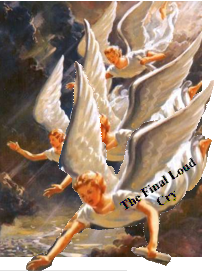
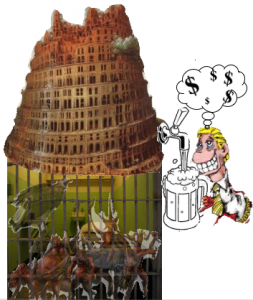
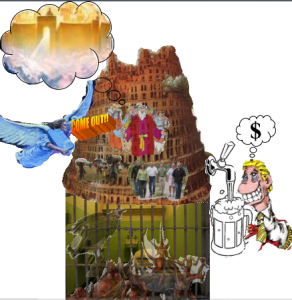
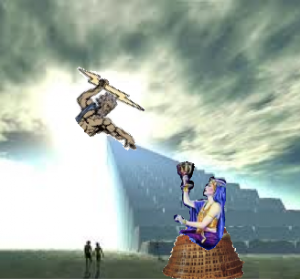
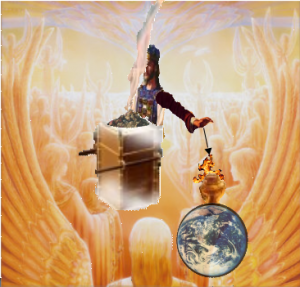
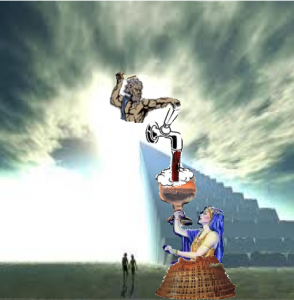


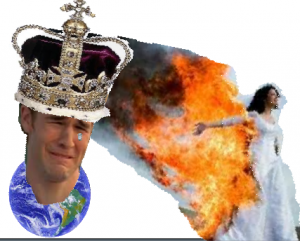
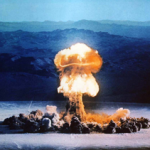
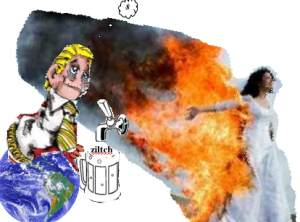

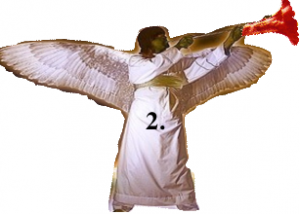

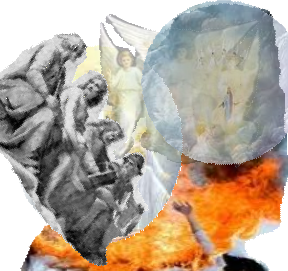
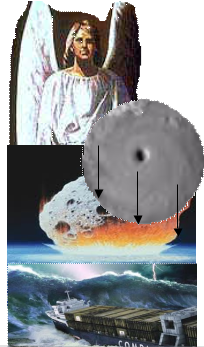
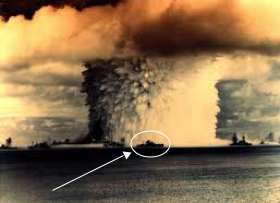
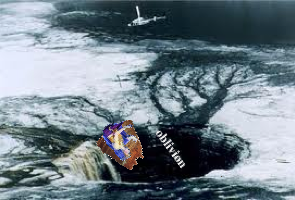
Hey! Please! If possible, let me have access to the Book of Revelation whose understanding of interpretations is made simple.
The Book of Revelation referred to in these studies is the last book in the Holy Bible.